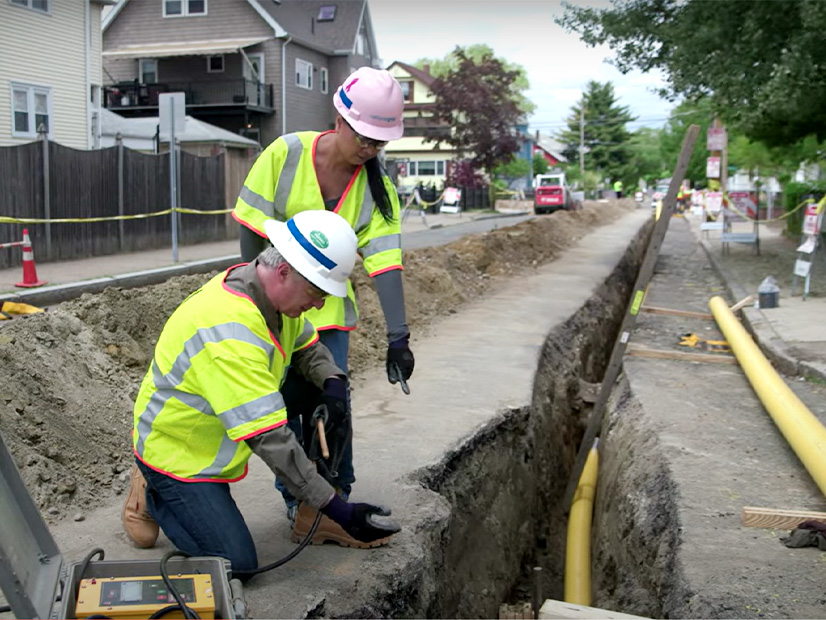The Massachusetts Gas System Enhancement Plan (GSEP) Working Group submitted its final report to the state Legislature at the end of January, providing a series of recommendations on aligning the state’s efforts to replace leak-prone pipes with its climate mandates.
Intended to inform lawmakers as they attempt to craft an omnibus climate bill this spring, the recommendations also highlight key areas of contention between the gas utilities, climate advocates and state officials. (See Mass. Lawmakers Aiming for an Omnibus Climate Bill in 2024.)
The working group consisted of representatives from a wide range of stakeholders, including state agencies (The Attorney General’s Office, Department of Environmental Protection, Department of Public Utilities and Department of Energy Resources), nonprofits (Conservation Law Foundation, HEET, Low-Income Energy Affordability Network, National Consumer Law Center and PowerOptions), and the state’s gas utilities (The Berkshire Gas Co., Eversource Energy, Liberty Utilities, National Grid and Unitil Corp).
The existing GSEP program dates to a 2014 law directing utilities to replace or repair old gas pipes to reduce methane leaks, allowing the utilities to recover the costs on an accelerated timeframe. The program has faced criticism for encouraging investment in the gas system as the state simultaneously moves to phase out its reliance on gas.
GSEP costs are expected to increase substantially in the coming years. An analysis by Dorie Seavey of Groundwork Data estimated capital expenditures from the program would cost ratepayers more than $34 billion between 2022 and 2039. The state Attorney General’s Office (AGO) estimated “if GSEP continues at its current pace, the total cost of this initiative will be approximately $40 billion over the next decade, an expense borne by ratepayers.”
The working group was initiated by the state’s 2022 climate law and worked throughout the past year to produce a series of recommendations.
Members of the working group voted on proposals to redefine the types of projects that are included and prioritized in the GSEP program, authorize the utilities to terminate gas service to existing customers within the scope of GSEP projects, and change the GSEP cost recovery timeline.
Repair and Retirement
The majority of the working group, including the state agencies and advocacy groups, voted to add language shifting the program from a focus on pipe replacement toward the inclusion of pipe repair and retirement to help minimize costs and avoid stranded assets as the state moves away from gas. The gas utilities and the United Steelworkers Union (USW) opposed adding language promoting repair.
Representatives for the state’s gas utilities argued that “it is more cost-effective and in the best interest of customers to replace pipe segments rather than undertaking extensive repairs that only serve to defer inevitable replacements.” The utilities voted in favor of adding language around pipe retirement.
The working group also favored requiring the utilities to evaluate non-gas pipe alternatives (NPAs) prior to GSEP repairs or replacements. The AGO wrote that this would force the gas companies “to be proactive about the transition to renewable energy.”
The gas utilities and USW opposed this requirement, arguing it undermines the purpose of the law. The gas utilities added they “do not believe it is practical or efficient to evaluate a NPA for all GSEP projects, and in fact, may result in delays to replacement of high-risk leak prone pipe, having a negative impact on safety.”
Emissions Limits
The group also voted to add language to specify that GSEP projects must be consistent with the state’s decarbonization mandates, including the sector-based emissions sublimits. This proposal was supported by most stakeholders, with partial opposition coming from gas utilities.
The utilities said the state should constrain the consideration of subsector emissions limits to the “Natural Gas Distribution and Service” sector, arguing that emissions limits that apply to natural gas consumption are beyond the scope of the GSEP program.
Redefining the Obligation to Serve
Most of the stakeholders also voted to add language allowing gas utilities to “terminate natural gas service to a customer” to implement non-gas GSEP upgrades that would provide similar heating service to customers. This was supported by the state agencies and advocacy groups, with several of the nonprofits stressing the need to add language protecting low-income ratepayers.
Redefining the obligation of local distribution companies to serve “can provide an opportunity for LDCs to identify opportunities for their participation in efforts to achieve net-zero greenhouse gas emissions,” commented the Conservation Law Foundation. “This is a potentially vital tool in Massachusetts’ transition to a clean energy future and should be considered as a viable change sooner rather than later.”
The gas utilities and USW opposed this proposal, arguing that changing the statutory obligation to serve existing gas customers is beyond the scope of the working group.
Cost Recovery Timelines
A plurality of members also supported a proposal by the AGO to phase out accelerated cost recovery for gas infrastructure investments, backed by the advocacy groups.
“GSEP is, at its core, a funding mechanism that allows utility companies to recover the costs of natural gas infrastructure replacement on an accelerated timeline,” the AGO wrote, adding that accelerated cost recovery encourages the “further institutionalization of natural gas infrastructure that should be largely phased out by 2050.”
The utilities and USW opposed this proposal. The utilities argued that repealing the accelerated cost recovery is beyond the working group’s scope, adding that the proposal “is tantamount to the repeal of the GSEP statute.”
The fate of the proposals now sits with the Legislature. The working group included two members of the Legislature, Sen. Mike Barrett (D) and Rep. Jeff Roy (D), co-chairs of the Legislature’s Joint Committee on Telecommunications, Utilities and Energy. Barrett typically voted in alignment with the advocacy groups and state agencies, while Roy abstained in the votes.




